Indian presidential election, 2007
| | |||||||||||||||||||||||
| |||||||||||||||||||||||
| |||||||||||||||||||||||
| |||||||||||||||||||||||
The Election Commission of India held indirect 13th presidential elections of India on 19 July 2007.[1] Pratibha Patil with 638,116 votes won over her nearest rival Bhairon Singh Shekhawat who got 331,306 votes. This result meant that Pratibha Patil became the first female President of India.
Candidates
Official candidates
On 14 June, Pratibha Patil, the governor of the state of Rajasthan, was declared by UPA as its candidate for the election. The Left and other allies of the United Progressive Alliance (UPA) such as Bahujan Samaj Party (BSP) and Dravida Munnetra Kazhagam (DMK) announced their support on Patil's candidature. Shiv Sena, an ally of the National Democratic Alliance (NDA) also supported Patil's candidature. The move came as a surprise as Patil's name was not mentioned among the probables by UPA so far.
Supported unofficially by the NDA, the then Vice President, Bhairon Singh Shekhawat filed his nomination as an independent candidate on 25 June 2007.
Potential candidates
Amidst much speculation by various party leaders and media, a lot of names were tossed around as being probable or desired persons for holding the post.
Initially Shivraj Patil and Pranab Mukherjee (both sitting cabinet ministers) emerged as the frontrunners[2] for the candidature. Other names which did the rounds in the UPA camp include Sushil Kumar Shinde and Karan Singh. Pranab Mukherjee was stated to be too critical at his current responsibility to stand for the Presidential elections and the Left parties opposed the candidature of Shivaraj Patil, Sushil Kumar Shinde and Karan Singh.[3]
On the other hand, the NDA stated that it would support Bhairon Singh Shekhawat, in case he decides to contest as an independent candidate.[4]
Other probables such as N.R. Narayana Murthy who received significant media hype did not appear to have gathered any support from any of the sides. Atal Bihari Vajpayee, a former prime minister who would have been NDA's probable candidate[5] denied his desire to become the next president.[6]
On 18 June, a set of parties with allegiance neither to UPA or NDA—All India Anna Dravida Munnetra Kazhagam (AIADMK), Telugu Desam Party (TDP) and Samajwadi Party (SP)—formed an alliance called the United National Progressive Alliance and announced their support for a second term for the incumbent, Abdul Kalam.[7] On 20 June a delegation of United National Progressive Alliance (UNPA) met Dr. Kalam with a request to contest the presidential elections, to which he replied that he is willing to contest only if there is a certainty of winning and that he is willing to wait for a few days for this certainty.[8] However, he soon announced he would not run.
On 14 July 2007, Tamil Nadu Legislative Assembly (Leader of Opposition) J. Jayalalitha announced that the UNPA unanimously decided to abstain from the presidential polls. However, the Election Commission of India held that the UNPA cannot ask its legislators to abstain from voting, quoting Section 171 C of the Indian Penal Code (IPC).
Process
 |
| This article is part of a series on the politics and government of India |
|
|
As per the electoral calculation following were the number of votes for respective political parties. Electoral College (India)
Figures are based upon and . Figure on Lok Sabha and Vidhan Sabha seats do not take into consideration splits, mergers, defections, expulsions and by-elections after general elections have been held.
Know Pratibha Patil
Know Pratibha Patil is part of the political campaign launched by the Bharatiya Janata Party (BJP) for the presidential election of 2007. It consists of a website and a PDF booklet (titled "Presidential Election 2007"), created by the BJP under the banner of Project India. Both contain the party's allegation in the form of a compilation of articles from various media. While announcing the website at a press conference, the BJP party general secretary Arun Jaitley also distributed a printed form of the booklet and described it as a compilation of articles / editorials from newspapers on the Presidential contest.[9][10]
The stated objective of the site is to "educate the people about Pratibha Patil, the nominee of UPA and Indian left for Indian presidential election scheduled on 19 July 2007". To support this, the website consists of various sections like 'Cartoon,' 'Pratibhaspeak' and 'UPA Doublespeak' and includes links to video clippings and articles that refer to the various allegations levelled against Pratibha Patil.
The website declares :
| “ | Even though the people do not elect the Rashtrapati, they have a vital stake in the Presidential poll since the winner will become head of the Republic of India. They have a right to know whether the likely winner is worthy of becoming the Head of State of the world's largest democracy. The need to know whether the person embodies, as far as possible, the lofty ideals enshrined in the Constitution of India, of which he or she will be the custodian, or he/she will be a rubber stamp of those who have catapulted him/her to the high Office. | ” |
BJP leader Arun Jaitley talking to news-persons called the website a "campaign to provide an informed choice to the electorate (the electoral college)". "The voter has a right to the information about the candidate he is voting for. This effort is intended for an informed choice of the electorate," Jaitley said.[11]
Arun Jaitley did not respond when asked what would happen to the right of information when people are "informed" only about one of the two Presidential candidates. He said the website would vanish after 21 July when the Presidential election result will be out.[9]
However the website can still be viewed via archive.org[12]
An INC spokesperson commented:
| “ | The exercise is futile and aimed at denigrating the office of President and maligning an individual.... There is a frustrated section in the BJP, a queer combination of the senile and juvenile that was denigrating institutions.[13] | ” |
BJP division
The Times of India reported that a section of BJP leaders had initially looked divided over supporting this campaign against Pratibha Patil. Party chief Rajnath Singh seemed reluctant to be drawn into a "personal attack" while senior party leader L. K. Advani spoke at length on the "pliant President" issue at the party's national executive last month.[11] Daily News and Analysis also reported on the apparent differences among senior leaders on this campaign and had this quote:
| “ | "Rajnath Singh has virtually dissociated himself from all this. Nor has there been any statement so far by former prime minister Atal Bihari Vajpayee attacking Patil," a party functionary said.[14] | ” |
Results
| MPs | MLAs | Total | |
|---|---|---|---|
| Pratibha Patil | 312,936 | 325,180 | 638,116 |
| Bhairon Singh Shekhawat | 164,256 | 167,050 | 331,306 |
Source: "India gets first woman president". NDTV.com. 2007-07-21. Retrieved 2007-07-21.
References
- ↑ Indian MPs vote for new president. BBC News. Retrieved on 19 July 2007.
- ↑ NDTV.com: Presidential race: UPA narrows down to Pranab, Patil
- ↑ Press Trust of India (2007-06-14). "Pratibha Patil is UPA-Left nominee for Prez poll". Retrieved 2007-06-14.
- ↑ "Prez polls: Shekhawat can contest as independent". The Times Of India. India. 6 June 2007.
- ↑ NDTV.com: Mamta propose Vajpayee as President
- ↑ I have no desire to be the President: Vajpayee
- ↑ http://www.ibnlive.com/news/politics/06_2007/patil-a-joke-played-by-sonia-kalam-is-best-third-front-43132.html
- ↑ Kalam surprises Third Front by his changed stance
- 1 2 BJP creates website on Pratibha Patil The Hindu – 11 July 2007
- ↑ BJP launches website against Pratibha Sahara Samay – 10 July 2007
- 1 2 Know Patil better: BJP puts up website "Know Patil better: BJP puts up website" Times of India, 11 July 2007
- ↑ http://web.archive.org/web/20070715091859/http://www.knowpratibhapatil.com/
- ↑ Bid to malign her, says Congress The Hindu – 11 July 2007
- ↑ BJP divided over campaign against Patil "Bid to malign her, says Congress" DNA. 11 July 2007
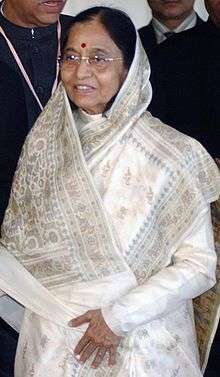

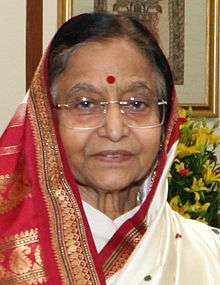
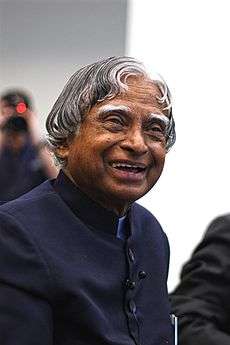
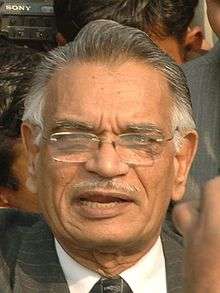
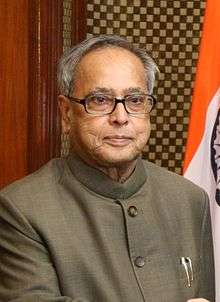


.jpg)